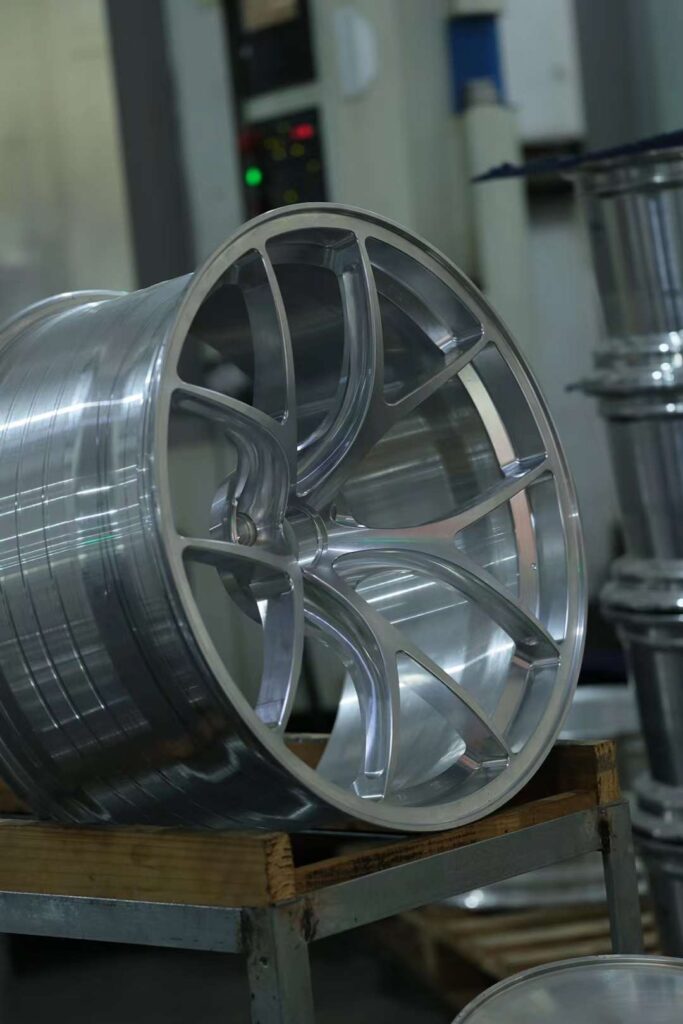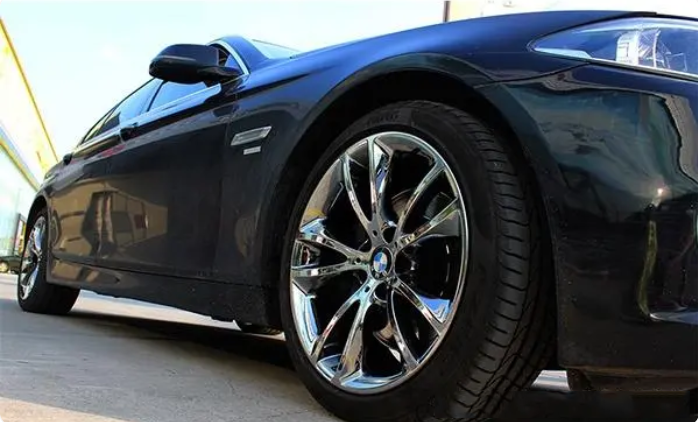¿Son buenas las llantas forjadas para la conducción diaria?
How to Choose Wheel Hub Size? How Does Wheel Hub Size Affect Vehicle Stability?
I. How to Choose Wheel Hub Size?
The wheel hub is an important component of a vehicle, playing a crucial role in its operation.
There was once a saying that “bigger wheels are better, smaller wheels are worse”, but this has now been proven to be untrue.
First, larger wheel hubs mean more weight, which can affect the vehicle’s acceleration and braking performance.
The larger the wheel hub, the heavier the wheel, and the greater the inertia, which can impact the vehicle’s acceleration and deceleration.
For some high-performance vehicles, due to their extremely powerful engines, some sports cars are designed with larger wheel hubs to better transfer the engine’s power into driving force.
However, for ordinary passenger cars, larger wheel hubs can actually reduce acceleration and braking performance.
Secondly, using larger wheel hubs will reduce the vehicle’s suspension performance and increase vibrations.
As the wheel hub size increases, the vehicle’s suspension system also needs to be correspondingly strengthened, otherwise the vehicle may experience abnormal vibrations and bouncing during driving, affecting driving comfort.
At the same time, the vehicle’s suspension system also needs to bear a greater weight, making it more prone to wear and tear.

Third, larger wheel hubs can affect the vehicle’s fuel economy.
Using larger wheel hubs requires more fuel consumption to provide sufficient power, and the larger hub surface area also increases air resistance, leading to increased fuel consumption for the vehicle, thereby affecting fuel economy.
For daily-use vehicles, this will result in additional costs.
In summary, larger wheel hubs are not necessarily a better choice, and the wheel hub size should be chosen based on the vehicle model and specific usage conditions.
For vehicles that require better performance, choosing a larger wheel hub can increase driving performance.
But for passenger cars, the wheel hub size that suits the vehicle’s own specifications should be selected to ensure better driving safety and comfort.
How to Choose Wheel Hub Size? How Does Wheel Hub Size Affect Vehicle Stability?
II. How Does Wheel Hub Size Affect Vehicle Stability?
The wheel hub is a very critical component of a vehicle. It is not just a decorative accessory, but the source of support and sustaining force for the vehicle’s driving on the road.
Therefore, the wheel hub size has a very significant impact on the stability and performance of the vehicle.
So, what size of wheel hub is the best?
First, the wheel hub size should match the vehicle’s brand, model and intended use.
For example, some large off-road vehicles or trucks require larger wheel hubs to provide better support and stability, while smaller vehicles can opt for smaller wheel hubs.
Additionally, the wheel hub size should also consider the driving terrain and speed, to ensure the vehicle maintains balance and stability in various conditions.
Secondly, the wheel hub size should also match the tire size.
Generally speaking, the diameter of the wheel hub and the width of the tire should be as close as possible, so that the tire and wheel hub can have a higher degree of fit, thereby improving the vehicle’s stability and driving performance.
Lastly, the wheel hub size can also affect the vehicle’s fuel economy.
Larger wheel hubs will raise the vehicle’s center of gravity, making the vehicle more prone to bouncing and swaying, thereby increasing the vehicle’s fuel consumption.
Therefore, selecting the appropriate wheel hub size can improve the vehicle’s fuel economy and driving comfort.
In summary, the wheel hub size is related to the vehicle’s brand, model, intended use, tire size, and road conditions.
Therefore, choosing the best wheel hub size requires comprehensive consideration of the specific situation, in order to ensure the vehicle’s stability and performance, as well as improve its fuel economy and driving comfort.
How to Choose Wheel Hub Size? How Does Wheel Hub Size Affect Vehicle Stability?
Classification and Application Scenarios of Automotive Wheel Hubs
Automotive wheel hubs are an important component of a vehicle, as they bear the weight and torque of the vehicle during driving, significantly impacting the vehicle’s performance and safety.
Based on various aspects such as material, manufacturing process, and characteristics, automotive wheel hubs can be classified into multiple types.
This article will discuss the classification, advantages, disadvantages, and application scenarios of automotive wheel hubs from the perspectives of materials and manufacturing processes.
I. Classification by Material
- Steel Wheel Hubs
- One of the most common types of wheel hubs, made of steel.
- Advantages: low price, good stability, high durability, resistance to high temperatures, and strong impact resistance.
- Disadvantages: heavy weight, affecting the vehicle’s acceleration performance and suspension system.
- Application Scenarios: suitable for vehicles in normal road conditions, such as family sedans and commercial vehicles.
- Aluminum Alloy Wheel Hubs
- Advantages: lightweight, aesthetically pleasing, good heat insulation, and reduced vehicle fuel consumption.
- Disadvantages: relatively high price, prone to scratches and damage.
- Application Scenarios: suitable for high-end vehicles, racing cars, and off-road vehicles.
- Carbon Fiber Wheel Hubs
- Advantages: lightweight, sturdy, high rigidity, high-temperature resistance, and excellent wear resistance.
- Disadvantages: high manufacturing cost.
- Application Scenarios: suitable for high-performance vehicles and racing cars, improving vehicle performance and driving safety.
Classification by Manufacturing Process
- Cast Wheel Hubs
- Cast wheel hubs are formed by pouring molten copper, iron, and aluminum metals into a wheel hub mold, which is then dried and removed to create the wheel hub.
- Advantages: simple manufacturing process, high production efficiency, and low price.
- Disadvantages: internal looseness defects, lower wheel hub strength.
- Application Scenarios: suitable for daily urban driving vehicles, such as commercial vehicles, family sedans, and sports cars.
- Forged Wheel Hubs
- Forged wheel hubs are shaped by hammering the metal material under high temperature and high pressure using a large copper hammer.
- Advantages: lower manufacturing cost, more robust than cast wheel hubs.
- Disadvantages: slower production speed, requiring longer processing time.
- Application Scenarios: suitable for high-end vehicles, such as racing cars and off-road vehicles, where high strength and high toughness are required.
In conclusion, different types of wheel hubs are suitable for different vehicle types and driving scenarios. Consumers should choose the wheel hubs that best suit their needs and financial situation.

black forged rims 5
Classification and Application Scenarios of Automotive Wheel Hubs
Automotive wheel hubs are an important component of a vehicle, as they bear the weight and torque of the vehicle during driving, significantly impacting the vehicle’s performance and safety. Based on various aspects such as material, manufacturing process, and characteristics, automotive wheel hubs can be classified into multiple types. This article will discuss the classification, advantages, disadvantages, and application scenarios of automotive wheel hubs from the perspectives of materials and manufacturing processes.
I. Classification by Material
- Steel Wheel Hubs
- One of the most common types of wheel hubs, made of steel.
- Advantages: low price, good stability, high durability, resistance to high temperatures, and strong impact resistance.
- Disadvantages: heavy weight, affecting the vehicle’s acceleration performance and suspension system.
- Application Scenarios: suitable for vehicles in normal road conditions, such as family sedans and commercial vehicles.
- Aluminum Alloy Wheel Hubs
- Advantages: lightweight, aesthetically pleasing, good heat insulation, and reduced vehicle fuel consumption.
- Disadvantages: relatively high price, prone to scratches and damage.
- Application Scenarios: suitable for high-end vehicles, racing cars, and off-road vehicles.
- Carbon Fiber Wheel Hubs
- Advantages: lightweight, sturdy, high rigidity, high-temperature resistance, and excellent wear resistance.
- Disadvantages: high manufacturing cost.
- Application Scenarios: suitable for high-performance vehicles and racing cars, improving vehicle performance and driving safety.
Classification by Manufacturing Process
- Cast Wheel Hubs
- Cast wheel hubs are formed by pouring molten copper, iron, and aluminum metals into a wheel hub mold, which is then dried and removed to create the wheel hub.
- Advantages: simple manufacturing process, high production efficiency, and low price.
- Disadvantages: internal looseness defects, lower wheel hub strength.
- Application Scenarios: suitable for daily urban driving vehicles, such as commercial vehicles, family sedans, and sports cars.
- Forged Wheel Hubs
- Forged wheel hubs are shaped by hammering the metal material under high temperature and high pressure using a large copper hammer.
- Advantages: lower manufacturing cost, more robust than cast wheel hubs.
- Disadvantages: slower production speed, requiring longer processing time.
- Application Scenarios: suitable for high-end vehicles, such as racing cars and off-road vehicles, where high strength and high toughness are required.
In conclusion, different types of wheel hubs are suitable for different vehicle types and driving scenarios. Consumers should choose the wheel hubs that best suit their needs and financial situation.
For more forged wheels, please contact us, or visit our products at our page https://jlwheels-manufacturer.com/en/products/gutchon-forged-wheels/
